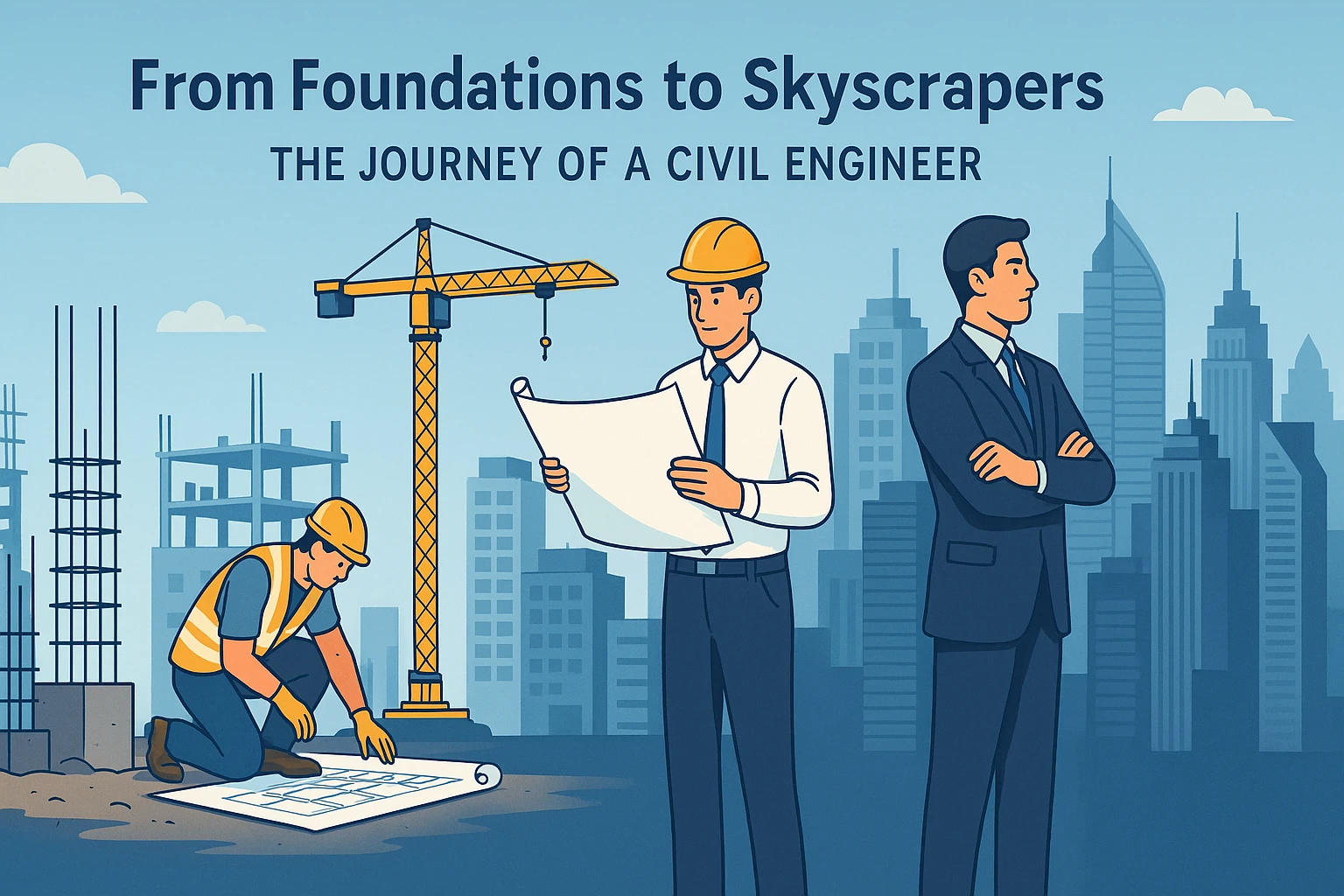From Foundations to Skyscrapers: The Journey of a Civil Engineer

Blog / April 11, 2025
civil engineering courseB.Tech. Civil EngineeringB.Tech. Civ. Engg.From designing futuristic hyperloop systems to pioneering earthquake-resistant infrastructures, civil engineering is the invisible force shaping modern civilization. This dynamic discipline blends structural ingenuity, environmental sustainability, and advanced materials science to create the backbone of urban and rural landscapes. Whether it's hydraulic engineering revolutionizing water conservation or geotechnical innovations stabilizing complex terrains, civil engineers are the architects of progress.
A civil engineering course is more than just blueprints and calculations; it's a gateway to mastering the science behind resilient infrastructure, smart cities, and sustainable development. With evolving technology and industry demands, this field offers a plethora of opportunities for aspiring engineers ready to transform theoretical knowledge into groundbreaking solutions.

Source:https://www.startus-insights.com/
Table of Content
- Understanding the Civil Engineering Course
- Civil Engineering Course Duration
- B.Tech. Civil Engineering Fees
- Career Opportunities After a Civil Engineering Course
- Constructing a Better World: Civil Engineering @ Shiv Nadar University (Institution of Eminence)
- Final Thoughts
- FAQs
Understanding the Civil Engineering Course
Aspirants who enrol in civil engineering gain the professional abilities needed to study structures, geotechnical engineering, transportation systems and environmental engineering. The program combines abstract classroom material with direct engineering practice through mandatory laboratory assignments and internship opportunities. Through this education, students encounter modern construction practices like AI-assisted procedures and gain knowledge about green building supplies with smart infrastructure systems.
The civil engineering course generally focuses on the following core areas:
- Structural Engineering
- Geotechnical Engineering
- Transportation Engineering
- Environmental Engineering
- Construction Management
Civil Engineering Course Duration
The civil engineering course duration depends on the study level alongside the particular institution. The Bachelor of Technology (B.Tech) civil engineering program spreads across four years into eight semesters. The curriculum design splits every semester into theoretical classes combined with laboratory exercises and project development work.
Advanced education courses include both M.Tech Civil Engineering programs that last two years combined with full-time or part-time Ph.D. programs, which extend from three to five years for doctoral research. Civil engineering degree students have the chance to specialize their knowledge in several fields including earthquake engineering, structural dynamics and water resource engineering.
B.Tech. Civil Engineering Fees
Pursuing a B.Tech. Civil Engineering degree involves various expenses. Below is a detailed breakdown of the approximate fee range for different types of institutions in India:
|
Type of Institution |
Tuition Fee Range (per year) |
Additional Expenses |
|
Government Colleges |
INR 50,000 – 2 Lakhs |
Hostel fees, lab charges, study materials |
|
Private Universities |
INR 2 – 9 Lakhs |
Hostel fees, lab charges, study materials |
|
Deemed Universities |
INR 2 – 5 Lakhs |
Research materials, industrial training fees |
|
Autonomous Institutes |
INR 2 – 4 Lakhs |
Lab charges, study tours, project work |
Career Opportunities after a Civil Engineering Course
Graduates of a civil engineering course have diverse career opportunities in both the public and private sectors. Some of the key career paths include:
- Structural Engineer
- Construction Manager
- Geotechnical Engineer
- Urban Planner
- Transportation Engineer
- Environmental Engineer
- Government Sector Jobs
- Academia and Research
Constructing a Better World: Civil Engineering @ Shiv Nadar University (Institution of Eminence)
The B.Tech. in Civil Engineering at Shiv Nadar University moulds students into excellent professional engineers by training them in different aspects of Civil engineering through analytical, modern technological, and computational courses. Students get exposed to practical-based teaching and learning with the help of extensive and varied laboratory facilities, field visits, and internships in the industry.
B.Tech. Civil Engineering Specializations
The School of Engineering offers civil engineering specializations in the following areas:
- Sustainable Infrastructure Systems
- Water, Environment, and Climate
- Urban Network Systems.
OUR Program
Shiv Nadar University’s ‘Opportunities for Undergraduate Research’ (OUR) program aims to give students hands-on experience conducting complex research and carrying out independent work under faculty supervision. By taking part in the OUR program, you are encouraged to satisfy your natural inquisitiveness and grow your expertise in research methodology. As a result, you can earn recognition in the field of research from your early years in undergraduate studies.
Additionally, B.Tech. Civil Engineering graduates of Shiv Nadar University have been successfully employed in both public (CPWD, NHAI, BRO, MES, Railway, Minister of Water Resources, etc.) and private sectors (Shapoorji Pallonji, Larsen & Toubro, Tata Projects, Saint-Gobain, RITES Ltd, etc.)
Final Thoughts
Those who pursue studies in civil engineering access fulfilling employment opportunities to construct vital infrastructure projects. Civil engineering graduates are ready to handle contemporary construction challenges after their academic studies, practical learning, and industry exposure. The field of civil engineering provides you with unlimited prospects, including resilient structure construction, sustainable solution development and improved transportation system design.
While choosing the right institution, you should thoroughly assess the Civil Engineering course duration and B.Tech. Civil Engineering fees to make an informed choice about the right institution. Aspirants aiming to become next-generation construction pioneers can choose Shiv Nadar University as their medium to kickstart their journey toward a successful engineering career.
FAQs
1. What is a civil engineering course, and what does it cover?
A civil engineering course focuses on designing, constructing, and maintaining infrastructure like roads, bridges, buildings, and water systems. It covers core areas such as structural engineering, geotechnical engineering, transportation engineering, environmental engineering, and construction management.
2. What is the civil engineering course duration?
The B.Tech. Civil Engineering program typically lasts four years (eight semesters). Higher studies, such as an M.Tech in Civil Engineering, take two years, while Ph.D. programs may extend from three to five years.
3. How much are the B.Tech. Civil Engineering Fees in India?
The B.Tech. Civil Engineering Fees vary by institution.
- Government colleges: ₹50,000 – ₹3 lakhs per year
- Private universities: ₹2 lakh – ₹9 lakh per year
Financial aid, scholarships, and education loans are available at many institutions.
4. What are the career opportunities after completing a civil engineering course?
Graduates can work in both public and private sectors in roles such as:
- Structural Engineer – Designing buildings and bridges
- Construction Manager – Overseeing infrastructure projects
- Geotechnical Engineer – Analyzing soil and rock for construction
- Urban Planner – Designing efficient city layouts
- Transportation Engineer – Improving road and rail systems
- Environmental Engineer – Creating eco-friendly solutions
5. Is civil engineering a good career option?
Yes, civil engineering offers stable job opportunities, competitive salaries, and diverse work environments. With growing infrastructure demands and sustainability initiatives, it remains a highly rewarding career choice.